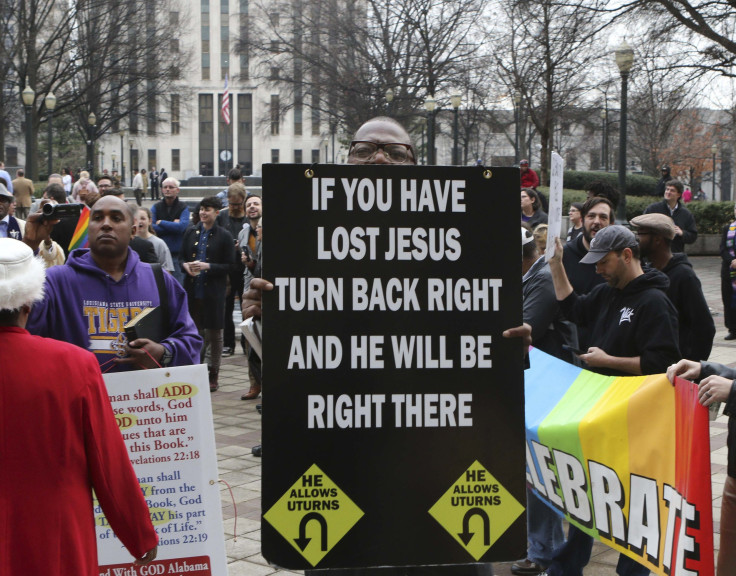Gay Marriage 2015: Alabama Same-Sex Unions Unlikely To Change Conservative Politics In Deep South, Experts Say

To outsiders, the image of gay and lesbian couples lining up to obtain marriage licenses at courthouses across the ultra-conservative state of Alabama might signal a new era of progressive politics in the Deep South. But as some Southerners and gay marriage activists celebrated Monday’s Supreme Court decision lifting a hold on same-sex marriages in the state, there wasn’t widespread hope that the region would soon abandon its conservative religious values opposing the expansion of lesbian, gay, bisexual and transgender rights. They noted how the actions of officials opposed to same-sex marriage leading up to Monday’s decision were strikingly consistent with the Southern reputation for bucking the federal government on issues of equality and civil rights.
“It’s hard to see what’s been going on the last couple of weeks and not be struck by the similarities to segregation – it’s sort of sad,” said Josh Rothman, a 15-year resident of Alabama who teaches history and African-American studies at the University of Alabama in Tuscaloosa. Rothman was referring to the confusion he said was sewn by the state’s chief justice, Roy Moore, who publicly encouraged probate judges across Alabama to ignore a federal judge’s ruling finding the state’s ban on same-sex marriages unconstitutional in January. U.S. District Court Judge Callie Granade allowed the ban to remain in place until Monday, giving the state time to appeal to the Supreme Court. But the justices early on Monday denied Alabama’s request.
That meant Alabama became the second gay marriage state in the Deep South and the 37th state overall to legalize same-sex marriage. Still, Moore’s statements against the ruling created what some considered a chaotic environment for Alabama couples trying to tie the knot. Some probate judges issued licenses, as required, while others did not issue marriage licenses to any couples, gay or straight. Some probate judges did issue licenses to all but refused to perform ceremonies for same-sex couples.
Some gay marriage proponents said they saw parallels to the 1960s, when Southern officials -- faced with obeying federal orders to desegregate bus, lunch counters and schools, and remove barriers to voter registration for nonwhites -- resisted violently or shunned other businesses and community members who complied. “This is following in the footsteps of George Wallace from an earlier era,” said Richard Cohen, president of an Alabama-based legal advocacy group, the Southern Poverty Law Center. He was referring to the former state governor widely known for opposing Martin Luther King Jr.’s movement against black voter disenfranchisement in the Deep South leading up to the Voting Rights Act of 1965. The ordeal was depicted in the recent film “Selma.”
Cohen didn’t expect same-sex marriage in Alabama or any Southern state to push the states’ politics in the progressive direction. “I think the prejudice against the LGBT community is quickly dissipating and, not too long from now, it will catch up in the Deep South,” he said, adding that social conservative messages against marriage equality “will carry weight” in future local and statewide elections.
The Rev. Jasmine Beach-Ferrera, the executive director for the North Carolina-based group Campaign for Southern Equality, said she personally identified with Cari Searcy and Kim McKeand, the Alabama couple who brought one of the legal challenges to the state’s gay marriage ban. Beach-Ferrera was legally married to her wife in another state in 2006, but felt like “a stranger to my son” until North Carolina won marriage equality last October. “Our fundamental hope is that LGBT people and families would be treated equal under the law and in the social fabric of the South,” Beach-Ferrera said.
There has been some organic movement toward change in recent years. The image of the Deep South as one that votes uniformly on conservative causes is not completely accurate, said John Giggie, who teaches history at the University of Alabama. Birmingham and Atlanta in Georgia, Charlotte, North Carolina and Richmond, Virginia, all large urban cities in the South, have thriving gay and lesbian communities where popular attitudes toward homosexuality have “at times tilted to the progressive,” Giggie said in an email.
On Jan. 6, Florida became the first state in the Deep South to allow gay marriages, after the Supreme Court declined to extend its request for a hold until justices hear a handful of civil rights cases in April. The nation’s highest court will hear oral arguments on marriage bans or restrictions in Michigan, Kentucky, Ohio and Tennessee, Reuters reported. If justice find in favor for gay couples, the court’s ruling could strike down 13 state bans on same-sex marriage. The ruling isn’t expected until June.
© Copyright IBTimes 2024. All rights reserved.












